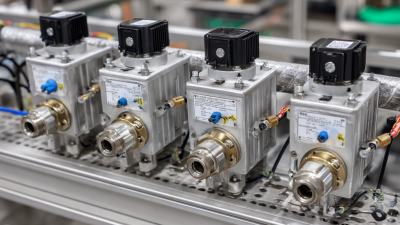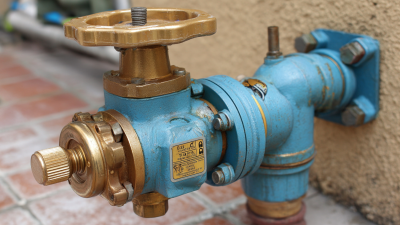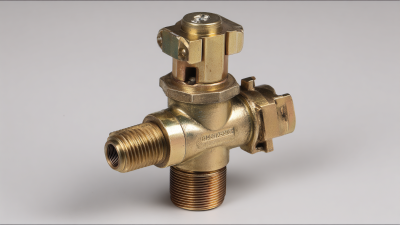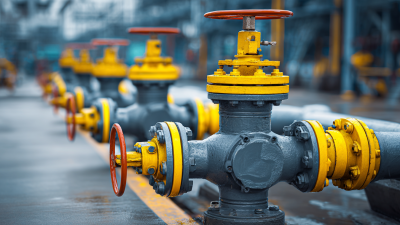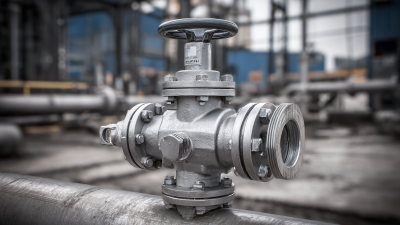
In today's rapidly evolving technological landscape, the importance of efficient fluid control systems cannot be overstated, especially in sectors ranging from agriculture to industrial automation. Water solenoid valves, which serve as pivotal components for regulating water flow in various applications, are becoming increasingly critical. According to a report by MarketsandMarkets, the global solenoid valve market is expected to reach USD 5.4 billion by 2025, driven by the rising demand for automated systems. These valves not only facilitate precise flow control but also enhance system reliability and reduce wastage, contributing to sustainable operational practices. As the world moves towards more intelligent water management solutions, understanding the functionality and benefits of water solenoid valves is essential for optimizing performance and achieving efficiency in modern applications.

 Water solenoid valves play a crucial role in modern fluid control systems, leveraging electromagnetic action to regulate water flow efficiently. At their core, these valves function through a simple yet effective mechanism. When an electrical current passes through the solenoid coil, it generates a magnetic field that pulls a plunger or armature, opening or closing the valve seat. This design allows for rapid on/off control, making them ideal for various applications, from irrigation systems to home automation setups.
Water solenoid valves play a crucial role in modern fluid control systems, leveraging electromagnetic action to regulate water flow efficiently. At their core, these valves function through a simple yet effective mechanism. When an electrical current passes through the solenoid coil, it generates a magnetic field that pulls a plunger or armature, opening or closing the valve seat. This design allows for rapid on/off control, making them ideal for various applications, from irrigation systems to home automation setups.
The benefits of using water solenoid valves are manifold. Firstly, they offer precise control over water flow, which is essential in maintaining desired pressure and volume in a system. Additionally, their compact design enables easy integration into existing systems without the need for extensive modifications. Water solenoid valves also enhance energy efficiency, as they reduce the risk of leaks and minimize water wastage. With their ability to operate automatically through timers or sensors, these valves significantly streamline operations, making them invaluable in both residential and industrial applications.
Water solenoid valves play a critical role in numerous industries by offering precise control over fluid flow. These devices function through an electromechanical mechanism that opens or closes in response to an electrical signal, making them an ideal choice for applications that require automation and reliability. According to a report by MarketsandMarkets, the global solenoid valve market is projected to reach USD 4.5 billion by 2026, underscoring the growing reliance on this technology across various sectors, including agriculture, manufacturing, and HVAC systems.
One of the key benefits of water solenoid valves is their ability to enhance efficiency and reduce water wastage. For instance, in agricultural irrigation systems, these valves enable precise control over water flow, leading to more effective water usage and improved crop yields. A study from the American Society of Agricultural and Biological Engineers indicates that automated irrigation can save up to 50% more water compared to traditional methods.
**Tips:** When selecting a water solenoid valve, it's crucial to consider the valve's response time and compatibility with existing systems. Regular maintenance checks can also ensure the longevity and efficiency of the valves. Establishing a monitoring system can further optimize performance and prevent leaks, ultimately conserving resources and reducing operational costs.
| Industry | Functionality | Benefits | Common Applications |
|---|---|---|---|
| Agriculture | Automated irrigation control | Water conservation and reduced labor costs | Sprinkler systems, drip irrigation |
| Manufacturing | Fluid automation in processes | Increased efficiency and precision in fluid handling | Cooling systems, hydraulic systems |
| HVAC | Temperature and humidity control | Enhanced comfort and energy savings | Water source heat pumps, chillers |
| Water Treatment | Regulating water flow during treatment processes | Improved water quality and operational reliability | Filtration systems, chemical dosing |
| Fire Protection | Control of water flow in sprinkler systems | Enhanced safety and quick response in emergencies | Fire sprinkler systems |
When comparing water solenoid valves to traditional mechanical valve solutions, it's essential to consider several key factors, including efficiency, automation capabilities, and installation flexibility. Solenoid valves have gained significant traction in various industries due to their ability to provide faster response times and precise control. According to a report by MarketsandMarkets, the global solenoid valve market is projected to reach $4.2 billion by 2026, driven by the increasing demand for automated systems in sectors like agriculture and irrigation.

In contrast, mechanical valves often require manual operation, which can lead to delays and increased labor costs. A study published in the Journal of Mechanical Engineering revealed that solenoid valves can reduce energy consumption by up to 30% compared to mechanical solutions when used in irrigation systems. Furthermore, these valves can easily integrate with smart technology, allowing for remote control and monitoring capabilities, which is becoming increasingly vital in modern applications. The adaptability and efficiency of water solenoid valves make them a preferred choice for many businesses looking to streamline their fluid control systems.
Smart water solenoid valves represent a significant innovation in water management, helping to optimize the efficiency of water systems in various applications. These advanced devices utilize electronic controls to regulate water flow automatically, responding to real-time data to enhance performance. By integrating technology such as IoT (Internet of Things), smart solenoid valves can be monitored and controlled remotely, allowing for prompt adjustments based on water usage patterns, pressure changes, or even leak detection.
**Tip:** When considering the integration of smart solenoid valves into your water management system, ensure compatibility with existing infrastructure and investigate options that offer user-friendly interfaces. This will simplify operation and maintenance, maximizing the benefits of your investment.
Another benefit of these innovative valves lies in their ability to reduce water waste, contributing to sustainable practices in both residential and industrial settings. With features like programmable schedules and automation based on environmental sensors, users can significantly lower their water consumption while maintaining optimal functionality. This not just promotes eco-friendliness but also leads to substantial cost savings over time.
**Tip:** Regularly assess the data provided by your smart solenoid valves to identify usage trends and optimize settings accordingly. This proactive approach can lead to further efficiencies, minimizing costs and ensuring responsible water usage in the long run.
Water solenoid valves play a vital role in various modern applications, yet their deployment comes with notable challenges. One significant issue is the precision required in their operation. In high-demand environments such as industrial settings, achieving accurate flow control can be complicated by factors like temperature fluctuations and sediment accumulation. These conditions can lead to malfunctioning valves, resulting in inefficiencies that could impact entire operations.
In addition to operational challenges, the solenoid valve market faces competitive pressure from emerging technologies. Innovations like IoT-based smart monitoring systems offer alternatives by providing real-time data and enhanced control over water quality and flow. Such advancements can mitigate some of the traditional issues associated with solenoid valves, such as delayed response times and mechanical wear. As industries seek greater efficiency and sustainability, exploring these alternatives may prove beneficial, driving a shift in how water control systems are designed and implemented in contemporary applications.
